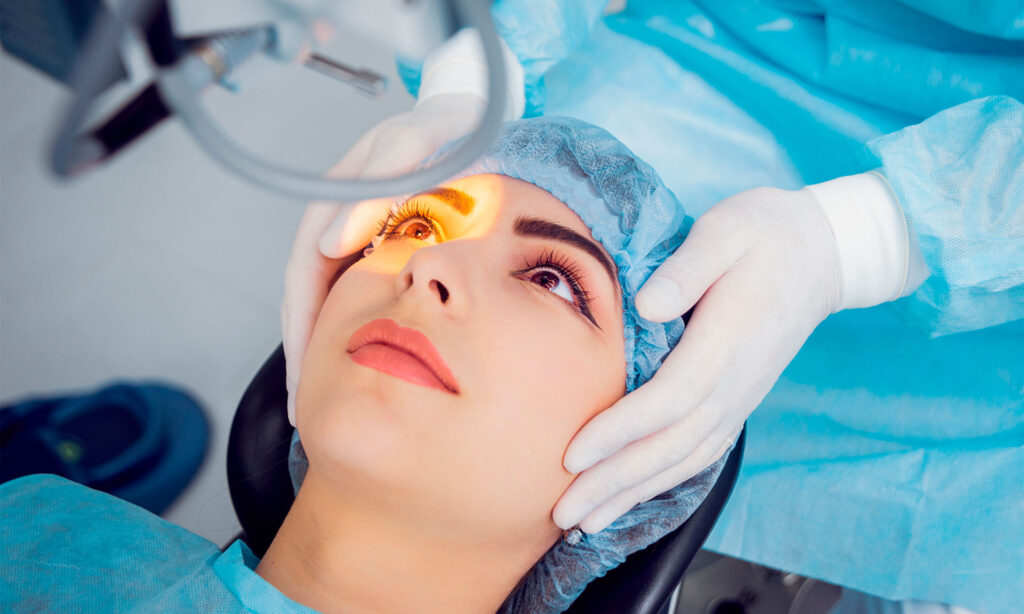The use of lasers in eye care has revolutionised the field of ophthalmology, bringing precision, safety, and efficacy to various treatments. At Shekar Eye Hospital, we harness advanced laser technology to deliver state-of-the-art care, ensuring better outcomes for our patients. This blog will explore how lasers are used in eye treatments, their benefits, and the most common procedures.
What Are Lasers and How Do They Work?
A laser (Light Amplification by Stimulated Emission of Radiation) emits focused light energy that can be used in medical treatments for its precision and control. In eye care, lasers can target specific tissues without affecting surrounding areas, making them ideal for delicate eye structures.

Benefits of Laser Technology in Eye Care
1. Precision and Accuracy
Lasers offer unparalleled accuracy, allowing ophthalmologists to perform intricate procedures with minimal risk. This precision helps in targeting specific areas of the eye while preserving surrounding tissues.
2. Minimally Invasive Procedures
Laser treatments are less invasive compared to traditional surgeries. Patients experience less discomfort, faster recovery times, and fewer complications.
3. Effective for Various Conditions
From vision correction to treating complex retinal conditions, lasers have a wide range of applications in eye care.
Common Laser Procedures in Eye Care
1. LASIK Surgery
LASIK (Laser-Assisted In Situ Keratomileusis) is the most well-known laser procedure for correcting refractive errors such as myopia, hyperopia, and astigmatism. This procedure reshapes the cornea leading to clearer vision.
Benefits: Quick recovery, minimal discomfort, and reduced dependence on glasses or contact lenses.
2. Laser Treatment for Glaucoma
For patients with glaucoma, laser treatments like Selective Laser Trabeculoplasty (SLT) and Argon Laser Trabeculoplasty (ALT) help manage intraocular pressure by improving the drainage of aqueous humour.
Outcome: Better control of eye pressure and reduced reliance on medication.
3. Panretinal Photocoagulation (PRP)
PRP is commonly used for diabetic retinopathy, where laser spots are applied to the retina to prevent abnormal blood vessels from growing and causing further vision damage. This treatment helps stabilise vision but does not improve it.
Benefits: Helps prevent vision loss in diabetic patients.
4. Focal Laser Treatment
Focal laser treatment is used for conditions like macular oedema. By targeting specific leaking blood vessels, this procedure helps reduce fluid accumulation and swelling in the retina.
Advantages: Reduces the risk of vision deterioration and helps maintain visual function.
5. Barrage Laser Treatment
Barrage laser is used to treat retinal holes, tears and weak areas (lattice degeneration) in the peripheral retina.
Benefits: Reduces the risk of retinal detachment.
6. YAG Laser Capsulotomy
After cataract surgery, some patients may develop posterior capsule opacification (PCO), leading to blurry vision. A YAG laser capsulotomy clears this cloudiness by creating an opening in the lens capsule.
Results: Restores clear vision without the need for further invasive procedures.
Safety and Post-Treatment Care
Laser treatments are generally safe when performed by experienced ophthalmologists. Most procedures are conducted on an outpatient basis, requiring little to no recovery time. Post-treatment care typically involves eye drops to manage inflammation and prevent infection. Patients may experience temporary side effects such as blurred vision or mild discomfort, which usually subside within a few days.
Frequently Asked Questions (FAQs)
1: Are laser eye procedures painful?
Most laser procedures are virtually painless, as numbing eye drops are used. Patients may feel slight pressure or mild discomfort, but this is temporary.
2: How long does it take to recover from a laser eye procedure?
Recovery time varies depending on the procedure but is generally short.
3: Is laser treatment suitable for everyone?
Not everyone is a candidate for laser treatment. A comprehensive eye examination is necessary to determine suitability based on individual eye health.
Lasers have transformed eye care, enabling precise, effective, and safe treatment options for various eye conditions. We remain committed to utilising the latest laser technology at Shekar Eye Hospital to enhance patient care and vision health. Consulting with an experienced specialist ensures that any subtle changes in eye health are accurately monitored, leading to more effective, tailored care and proactive protection of your vision for the future.






